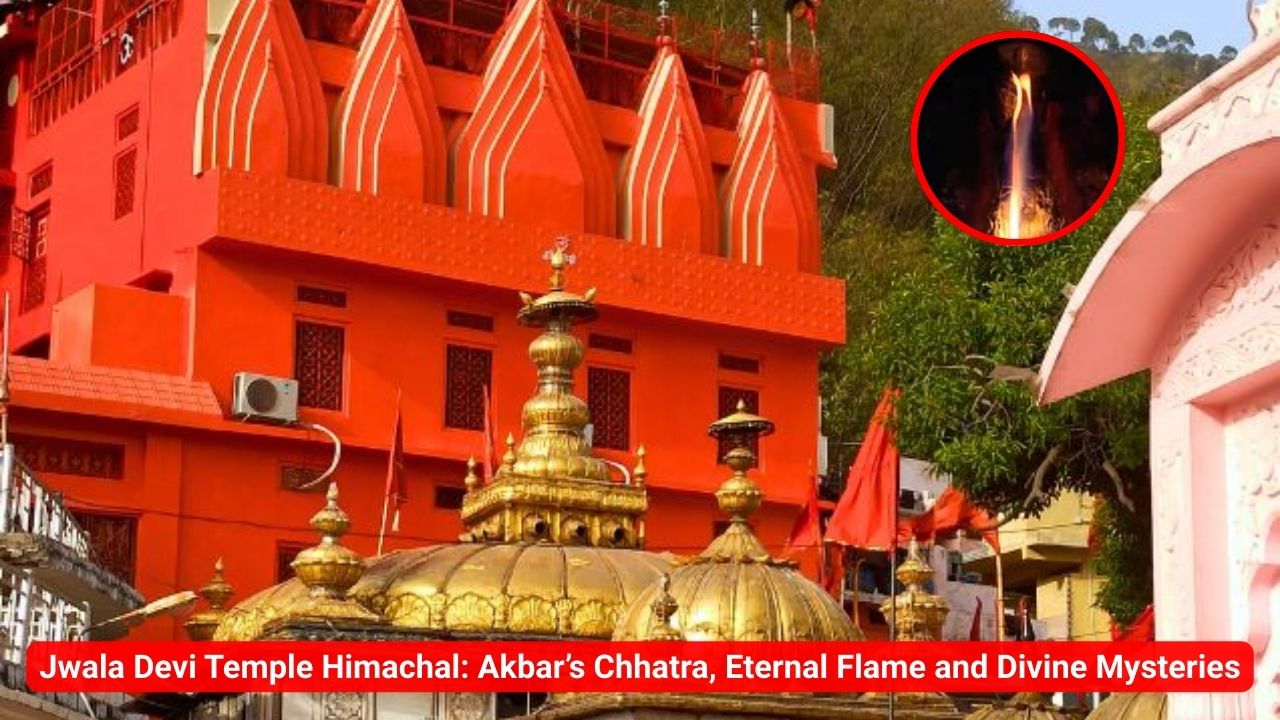In the tranquil hills of Himachal Pradesh, near Kangra, lies a temple unlike any other — Jwala Devi Temple. Here, the Goddess does not reside in stone or idol, but in flames that burn eternally. For centuries, these flames have glowed mysteriously, flickering without wick or oil, surviving storms, rains and time itself.

The Miracle of the Eternal Flame
The most wondrous feature of Jwala Devi Temple is its natural flames, emerging from crevices in the rock. Unlike ordinary lamps, these flames burn without oil or wick, defying logic and science.
Devotees believe these flames are the tongue of Goddess Jwala, ever-hungry for the devotion of her children. They are said to embody her fiery essence, consuming negativity and granting strength.
Scientists may study it, historians may speculate, but for a devotee standing before these flames, there is no doubt: the Goddess lives here, in fire.
Legends of the Temple
The temple is steeped in mythology. According to Hindu scriptures, when Sati immolated herself at her father’s yajna, Lord Shiva wandered in grief carrying her body. To calm his sorrow, Lord Vishnu cut Sati’s body into 51 pieces, which fell across the Indian subcontinent as Shakti Peeths.
At Jwala Devi, her tongue is believed to have fallen. This is why the flames here are considered the Goddess’s living form — the eternal tongue of Shakti.
Akbar’s Golden Chhatra: The Emperor Humbled
One of the most fascinating legends linked to Jwala Devi involves Mughal Emperor Akbar.
When Akbar heard of the miraculous flame that burned without fuel, he doubted its divinity. Determined to test it, he visited the temple and tried to extinguish the flame. But no matter what he did, the fire blazed on, untamed and eternal.
Humbled, Akbar offered a golden umbrella (chhatra) to the Goddess. Yet, the Goddess’s power could not be bribed — the umbrella is said to have mysteriously fallen, or darkened, a symbol that ego and power cannot stand before Shakti.
To this day, devotees recall this tale with awe, reminding themselves that no king, emperor or worldly force can overpower the eternal energy of the Mother.
The Pilgrim’s Experience
Visiting Jwala Devi Temple is unlike any other pilgrimage. The atmosphere itself vibrates with energy:
-
The sound of conch shells and bells echoes across the hills.
-
The air smells of incense and burning ghee, mingled with mountain winds.
-
As one approaches the sanctum, the sight of the eternal flame sends shivers through the body.
Some devotees feel a surge of heat and energy, others describe a calm presence wrapping around them like a mother’s embrace. Many believe their deepest wishes are fulfilled when offered sincerely before the flames.
During Navratri, the temple transforms into a sea of devotion — thousands gather, chanting hymns, offering coconuts and watching the flames dance as if responding to the collective prayers.
Architecture of Simplicity, Aura of Divinity
Unlike grand, ornate temples, Jwala Devi Temple’s architecture is simple, directing all focus to the flames themselves.
-
The sanctum houses the natural flames, glowing from fissures in the rock.
-
Around the temple are smaller shrines where devotees light diyas and offer prayers.
-
The temple stands surrounded by lush forests and mountains, its quiet majesty enhanced by nature’s own beauty.
This simplicity itself is the charm — it is not stone carvings or golden idols that make the place divine, but the living presence of the Goddess in fire.
The Spiritual Aura
Standing before the flames, one feels that time ceases to exist. The crackle of the fire, the rhythmic chants of “Jwala Mai ki Jai”, the mountain breeze swirling around the temple — everything merges into a single vibration of energy.
It is here that one realizes: the Goddess is not confined to form or ritual; she is living, eternal and formless, manifesting herself in ways that defy comprehension.
A Devotee’s Voice
A local priest once said:
“The flame you see is not ordinary fire. It is the Mother herself. Approach her with doubt and she tests you. Approach her with faith and she embraces you.”
Such is the nature of Jwala Devi — fierce yet loving, untamed yet protective, eternal yet intimate.
The Jwala Devi Temple is not just a place of worship — it is a living miracle. The eternal flame that burns without wick or oil is a reminder that divine energy transcends the laws of the world. Akbar’s golden chhatra lies as a testimony that even emperors must bow before the Mother.
For every devotee, visiting Jwala Devi is a journey of awakening. The flames do not just illuminate the sanctum; they light the fire within the soul, igniting faith, courage and devotion.
When you stand before the eternal flame, you do not see fire alone — you see the living, breathing presence of Shakti, the Mother of the Universe.
